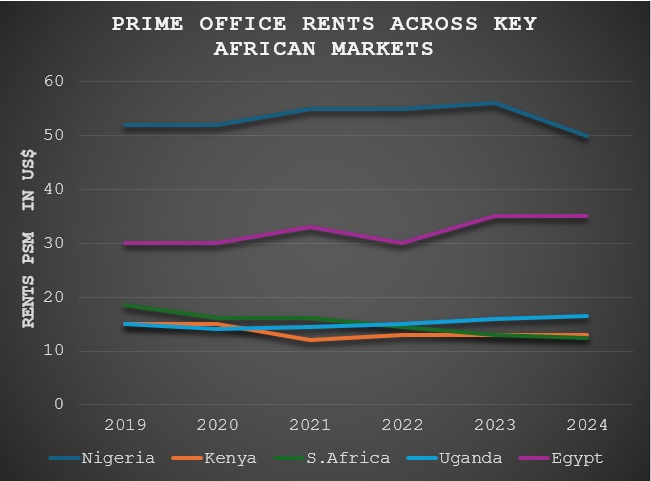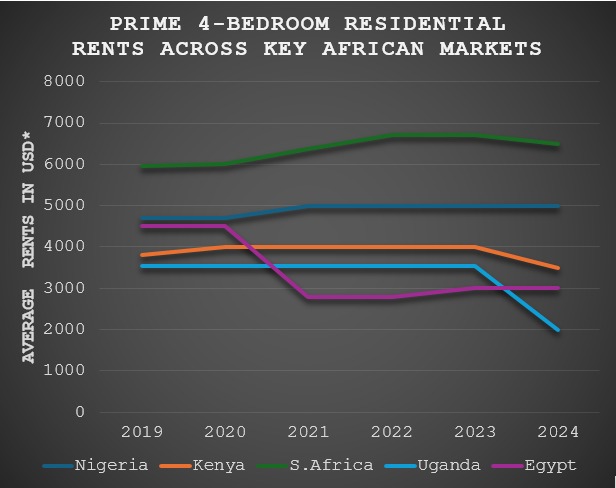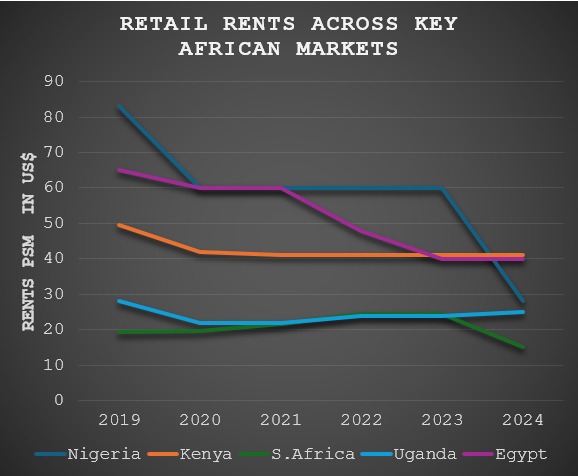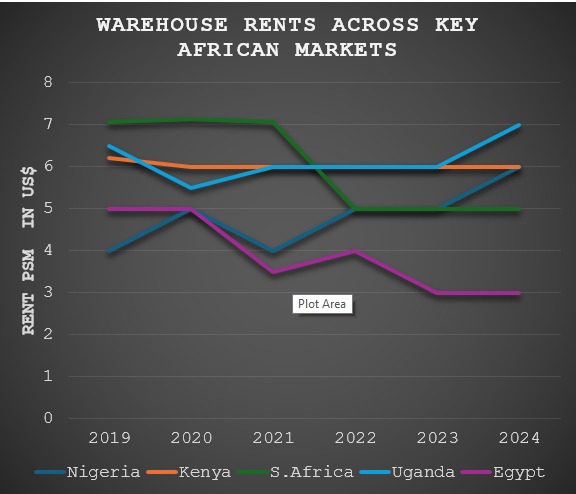- Office Occupancy Levels Across Africa increased by an average of 15 percent from 2022 numbers
- Knight Frank also points to rising investor interest in the continent’s manufacturing, mining, and energy sectors.
- In the retail market, there is a strong focus on enhancing consumer experiences across the continent.
Office occupancy levels across Africa’s office markets have recovered from 60 per cent in 2022 to 75 per cent this year, according to global property consultant, Knight Frank’s biennial 2024/25 Africa Report.
This notable improvement in office occupancy levels is largely attributed to the gradual return to the office following the disruption caused by the pandemic. For example, Kenya’s office occupancy rate now stands at 77 per cent, driven by the limited supply of prime offices – just 617,000 sqm is expected by the end of 2024, while take-up levels remain steady.
According to Mark Dunford, CEO, Knight Frank Kenya, there is a continent-wide increase in demand for grade A offices, particularly those with environmental, social, and governance (ESG) ratings.
“This mirrors a global move towards more sustainable buildings, not only because the built environment is responsible for 40 per cent of global carbon emissions, but also because of the direct link between talent attraction, retention and the occupancy of ESG-compliant buildings.”
He notes that this occupier behaviour is also encouraging developers to refurbish older buildings to meet the growing demand for ESG-compliant grade A offices.
Office Occupancy Levels Across Africa

“Indeed, this trend is already seen in a number of markets as office landlords move to sustain both demand and occupancy levels” added Dunford.
Knight Frank’s flagship report for Africa also underscores the shortage of true Grade A supply, which is further being compounded by a limited development pipeline, which highlights a clear opportunity for developers.
Separately, co-working space is also gaining popularity in countries like South Africa, Nigeria, and Kenya. In Kenya, fresh leases by Regus, Spaces, and Ikigai are catering to the growing demand for flexible work environments.
In markets like Zimbabwe, a shift from central business district (CBD) to suburban locations is spurring demand for out-of-town offices. This migration is being fuelled by traffic congestion, deteriorating infrastructure, inadequate parking, high operational costs, and noise pollution in central Harare. Consequently, CBD areas in Zimbabwe have seen office vacancy rates soar to between 40-60%, according to Knight Frank.
RESIDENTIAL SECTOR

Elsewhere, there has been a notable increase in mixed-use schemes as the ‘live-work-play’ mantra beds across the continent, prompted by households’ desire to minimise commuting times, while also having easy access to convenience retail.
Ben Woodhams, Partner at Knight Frank Africa Desk, said that the global trend of the ‘live-work-play’ model is driving demand for community living developments across Africa. However, for many households aspiring to transition from renting to owning, affordability remains a key concern.
“Developers are addressing this issue by offering innovative financing options, complementing government initiatives like Egypt’s ‘Housing for All’ scheme, which provides long-term subsidised mortgages. Meanwhile, other countries such as Nigeria and Angola are recording rising levels of demand as expats arrive to take up jobs in the oil and gas sector, while other locations such as Mauritius are enjoying a post-Covid resurgence in demand from second-home purchasers, particularly from countries such as South Africa and France.”
In the luxury residential sector, inflation is impacting construction costs, leading to landlords’ growing preference for dollar-denominated rents in markets like Nigeria. This shift has unsurprisingly boosted rents, with the average monthly rents for a 4-bedroom home in Lagos, for instance, now standing at approximately US$ 5,000, a 4.2% increase on 2020.
Read Also: Landsec sells London office property to Hong Kong developer
RETAIL MARKET

In the retail market, there is a strong focus on enhancing consumer experiences across the continent. There is a growing trend of retailers opening outlets in residential areas to meet the demand for convenience retail, Knight Frank says.
In Cameroon, a growing middle class and urbanisation are driving demand across various retail sub-sectors, including supermarkets, shopping malls, and e-commerce platforms. Major cities like Douala and Yaoundé are becoming retail hubs, attracting both domestic and international retailers. The Douala Grand Mall, for instance, which opened in 2020, epitomises this growth with its 140 stores, 22 restaurants, and five cinemas.
“In Côte d’Ivoire, Abidjan’s retail market stands out as more developed compared to other Francophone West African markets. New shopping malls have emerged in established areas, with significant competition between local market leader Prosuma and international entrant Carrefour, enhancing quality, variety, and pricing within the sector, much to the benefit of consumers” said Boniface Abudho, Africa Research Analyst at the firm.
Despite these advancements, informal retail remains dominant in countries like Tanzania, where approximately 90 per cent of food and beverage sales occur through traditional small stores and street vendors, Knight Frank’s report highlights. This dominance has led to an oversupply of formal retail space, with monthly prime rental rates stagnating at US$16 psm over the last five years and occupancy rates hovering at around 65 per cent.
INDUSTRIAL SECTOR
Africa’s industrial markets have shown remarkable resilience, bolstered by government initiatives in countries like Kenya and Zimbabwe, according to Knight Frank, while Special Economic Zones (SEZ) and Export Processing Zones (EPZ) are creating new demand.
The rise of e-commerce across the continent is driving requirements for efficient storage and distribution facilities, leading to the development of modern industrial zones equipped with state-of-the-art logistics infrastructure. Key examples of such developments include The Dube TradePort (30 million sqm) in South Africa and Dangote Industrial Park (26 million sqm) in Nigeria.
Knight Frank also points to rising investor interest in the continent’s manufacturing, mining, and energy sectors.
Abudho added that the National government efforts to attract investment through incentives and infrastructure development have contributed to the industrial sector’s resilience and expansion. A prime example is the Kribi deep water port in Cameroon, where US$ 1.3billion has been invested since construction began in 2011.

“The port features modern facilities capable of handling large vessels, including containers. Its proximity to the Kribi Industrial Zone further enhances its importance by facilitating the movement of goods to and from industrial facilities. However, challenges such as bureaucratic hurdles and infrastructure limitations, particularly the deteriorating N7 road, persist.”
“Similar initiatives to unlock the full potential of the industrial sector are underway elsewhere on the continent, including the US$ 10 billion Bagamoyo Port I in Tanzania. Unsurprisingly, this is driving developers such as Agility to expand their warehouse portfolio in Africa, such as their decision to build the 290,000 sqm Agility Park in Mozambique, which is also expected to help satisfy the surging demand for data centres.” he noted.
Read Also: Real estate firm Broll evaluates Kenya office space